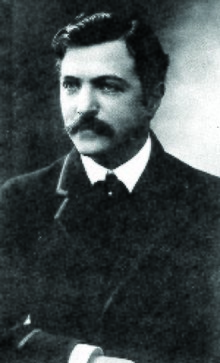Edmond Fleg
| Edmond Fleg | |
|---|---|
 | |
| Born |
Edmond Flegenheimer 26 November 1874 Geneva |
| Died |
15 October 1963 (aged 88) Paris |
| Nationality | French |
| Occupation | Writer |
Edmond Flegenheimer better known as Edmond Fleg, (26 November 1874 – 15 October 1963) was a Jewish French writer, thinker, novelist, essayist and playwright of the 20th century.
Life
Edmond Flegenheimer was born in Geneva on 26 November 1874. He was the son of Maurice Flegenheimer, merchant, and Clara Nordmann, and was the cousin of Julien Flegenheimer. He attended the Gymnasium in Geneva, then from 1892 studied in Paris, first at the Sorbonne and then at the École Normale Supérieure. In 1899 he qualified as a teacher of the German language.[1] He became the best friend of the editor Lucien Moreau (1875–1932), later one of the leaders of the Action Française. They agreed that Jewish and French nationalisms "traveled in parallel lines", and rejected assimilation.[2]
From 1904 to 1920 Fleg was a successful playwright. His work was influenced by the disturbances caused by the Dreyfus affair, by his participation in the Third Zionist Congress in Basel and by the reports of pogroms. Ecoute, Israël appeared between 1913 and 1948, and the Anthologie juive from 1923 to 1953. In 1928 F. die Schrift published his Pourquoi je suis juif. In 1949 he was co-founder of the Amitiés judéo-chrétiennes. His 1960 work Vers le Monde qui vient gave his message of hope with which he wanted to build a bridge to Christianity.[1]
Edmond Fleg died in Paris on 15 October 1963.[1]
Works
Edmond Fleg wrote many works in a variety of genres:
- Poetry
- Hear O Israel,
- The Lord is our God,
- The Lord is One,
- And thou shalt love the Lord.
- Translations
He translated a part of the Bible in French; Genesis in 1946 and Exodus in 1963.
- Opera Librettist
- He was originally commissioned to write the libretto in 1912, and completed a long version within that year.[3]
References
- 1 2 3 Fleg, Edmond – Historisches Lexikon.
- ↑ Moricz 2008, p. 103.
- ↑ Ewans 2007, p. 105.
Sources
- Ewans, Michael (2007), "Oedipe, Edsmond Fleg and George Enesco", in M. Ewans, Opera from the Greek: Studies in the Poetics of Appropriation, Ashgate, pp. 105–128
- Fleg, Edmond (in German), Historisches Lexikon der Schweiz, retrieved 2017-09-09
- Moricz, Klara (2008-02-05), Jewish Identities: Nationalism, Racism, and Utopianism in Twentieth-Century Music, University of California Press, ISBN 978-0-520-25088-8, retrieved 2017-09-08
Further reading
- "Ergebnis der Suche nach: Woe=118533843 im Bestand: Gesamter Bestand" (in German). DEUTSCHEN NATIONAL BIBLIOTHEK. Retrieved 18 September 2013.